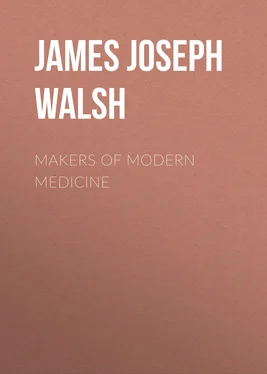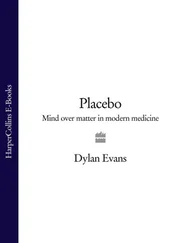James Walsh - Makers of Modern Medicine
Здесь есть возможность читать онлайн «James Walsh - Makers of Modern Medicine» — ознакомительный отрывок электронной книги совершенно бесплатно, а после прочтения отрывка купить полную версию. В некоторых случаях можно слушать аудио, скачать через торрент в формате fb2 и присутствует краткое содержание. Жанр: foreign_prose, Медицина, foreign_antique, на английском языке. Описание произведения, (предисловие) а так же отзывы посетителей доступны на портале библиотеки ЛибКат.
- Название:Makers of Modern Medicine
- Автор:
- Жанр:
- Год:неизвестен
- ISBN:нет данных
- Рейтинг книги:3 / 5. Голосов: 1
-
Избранное:Добавить в избранное
- Отзывы:
-
Ваша оценка:
- 60
- 1
- 2
- 3
- 4
- 5
Makers of Modern Medicine: краткое содержание, описание и аннотация
Предлагаем к чтению аннотацию, описание, краткое содержание или предисловие (зависит от того, что написал сам автор книги «Makers of Modern Medicine»). Если вы не нашли необходимую информацию о книге — напишите в комментариях, мы постараемся отыскать её.
Makers of Modern Medicine — читать онлайн ознакомительный отрывок
Ниже представлен текст книги, разбитый по страницам. Система сохранения места последней прочитанной страницы, позволяет с удобством читать онлайн бесплатно книгу «Makers of Modern Medicine», без необходимости каждый раз заново искать на чём Вы остановились. Поставьте закладку, и сможете в любой момент перейти на страницу, на которой закончили чтение.
Интервал:
Закладка:
It was not long after the establishment of the clinic on these broad lines at Vienna before the first important fruit of the new teaching method was to be gathered. Curiously enough, however, this initial advance in practical medicine did not come from one of the distinguished heads of the clinic, but from a comparatively young man of no previous reputation. The greatest discovery ever made at Vienna is due to Auenbrugger, an unassuming practitioner of medicine, who came from the Austrian province of Styria, or, as it is called in German, the Steiermark, about the middle of the eighteenth century. He was the son of a small hotel keeper of Gratz, and, after making his medical studies in Vienna, he remained at the capital for some years, doing hospital work.
While thus engaged, the young Styrian, who attracted very little attention except for his affability, and who made no pretension to special knowledge or genius in observation, laid the first stone in the structure of modern exact diagnosis of pulmonary disease, and cleared up many of the obscurities in which all affections of the chest had been shrouded before his time. Having accomplished this noteworthy achievement before he was forty years of age, Auenbrugger then quietly settled down to be an ordinary medical practitioner in the Austrian capital, with a special reputation for his knowledge of chest diseases, and for kindly ways that gave him as much interest in his poor patients as in those that could afford to pay handsomely for his services.
Leopold Auenbrugger, afterward Edler von Auenbrug–a term about equivalent to the English "Knight of Auenbrug"–who thus stands at the head of modern medical diagnosis, was born on the 19th of November, 1722, at Gratz, in Lower Austria. His early education was received at Gratz, and it seems to have been of rather a comprehensive character, for Auenbrugger, later in life, was a member of the elegant literary circles in Vienna and a welcome friend at the tables of cultured and distinguished fellow-townsmen. It will be recalled, by those who remember German literature, that at this time Vienna was the centre of culture in Germany, attracting many literary men–as, for instance, the two Schlegels–from other parts of Germany.
Auenbrugger's father was of the lower middle class, the proprietor of the Gasthaus Zum Schwarzen Mohren, in one of the suburbs of the city of Gratz, but also the owner of another hotel in the city itself, so that he was able, by making some sacrifices, to afford his son a university and medical education in Vienna. The family were not in very affluent circumstances, however, and in this Auenbrugger was in the same condition as many other of the distinguished medical men who have made important original discoveries. Volta, Laennec, Johann Mueller, Helmholtz, Pasteur and Virchow were all the sons of comparatively poor parents, and had to eke out their university education by doing teaching work as soon as they were considered capable.
Auenbrugger's studies in medicine were pursued under the well-known Baron Van Swieten. Van Swieten was, as has been said, one of the most distinguished of Boerhaave's pupils, and devoted most of his life to writing a set of commentaries on Boerhaave's aphorisms and editing his master's work. Van Swieten's greatest ambition was to make the Austrian capital the home of the great clinical school of medicine and a pilgrimage at least as attractive for physicians seeking to study practical medicine at the bedside as had been his own alma mater at Leyden. He was of so great administrative ability that Maria Theresa made him one of her state counsellors.
With all the influence of the government behind him, then, it is not surprising that Van Swieten succeeded in his very laudable project of establishing a great medical school at Vienna.
It was fortunate that Auenbrugger made his medical studies under such good auspices. We have no details of his student life nor of his success in his examinations. Even as a student his engagement of marriage to Marianna von Priesterberg was announced. The formal marriage ceremony took place in 1754, when Auenbrugger was about thirty-two years of age. His wife seems to have had a dowry, and this enabled Auenbrugger to begin his medical career in Vienna. Some years before this, as a young graduate physician, he had accepted the position of resident medical attendant at the Spanish military hospital of the Holy Trinity in Vienna. This hospital was large and important and provided manifold opportunities for clinical study. Its wards were frequently drawn on by the clinical department of the University of Vienna for cases to be demonstrated before the students.
This fact was sufficient to make Auenbrugger's position of great educative value for him. Mistakes in diagnosis would be apt to be discovered, since the interesting cases were reviewed by some of the best physicians of the time in Europe. His position carried with it no salary beyond his maintenance, but proved well worth the time he gave it, since it developed in him habits of careful investigation. Just ten years after he began his work at this hospital he published the little book called "Inventum Novum," or new discovery, on which his reputation depends. It was written in Latin, and its full title ran: "A New Discovery that Enables the Physician, from the Percussion of the Human Thorax, to Detect the Diseases Hidden within the Chest."
Altogether his little manual probably does not contain much more than ten thousand words. It is perhaps two or three times as long as thousands of medical articles published every year in our modern medical journals. It contains, however, one of the most important discoveries in the whole history of medicine. One of the best diagnosticians of the nineteenth century, Skoda, the distinguished head of the Vienna school of sixty years ago, calls the discovery that Auenbrugger outlined so unpretentiously "the beginning of modern diagnosis," and hailed Auenbrugger himself as the founder of the new science of diagnosis that was to prove so fruitful of good in the prevention of human suffering.
It is interesting to compare Auenbrugger's little book with Van Swieten's commentaries on Boerhaave's works, which were published in some eight huge volumes. Van Swieten's successor, De Haen, an equally illustrious contemporary of Auenbrugger, published about the same time some eighteen volumes on the science of medicine. Neither of these works is ever consulted now, except by some enthusiastic student of the history of medicine, who wishes to clear up a point in medical historical development; but Auenbrugger's unpretending monograph is, and will ever remain, a classic. Practically nothing has been needed to complete the clinical usefulness of his discovery. Like Laennec, whose work was done just half a century later, he had the genius to realize what the possibilities and the limitations of his discovery are, and he completed it in all its details before giving it to the public.
Auenbrugger's discovery consisted in recognizing that diseases of the chest can be distinguished from one another and their varying character differentiated by the sounds elicited when the chest is tapped with the finger. To this tapping he gave the technical name, since become classic in medicine, of percussion. Wherever there is air in the chest, that is all over the healthy lungs, the sound elicited by percussion resembles that given out by a drum over which a thick woolen cloth has been placed. Over the heart, where there is no air, the sound given out, when the chest is percussed, corresponds very nearly to the sound produced when the thigh is tapped. The sound elicited by percussion of the thigh Auenbrugger took as the standard of dulness and applied to it the term Schenkel-ton, or thigh sound.
When the lungs become consolidated because of an inflammatory process such as pneumonia or tuberculosis, then the percussion note over the consolidated area resembles the sound over the leg or that found over the heart. As a rule the heart is somewhat covered by the lungs, and the sound produced by percussion over it is not quite as dull as that over the solid muscular structures of the legs. Whenever fluid finds its way into the thorax, as in pleurisy, then the sound produced on percussion is very dull.
Читать дальшеИнтервал:
Закладка:
Похожие книги на «Makers of Modern Medicine»
Представляем Вашему вниманию похожие книги на «Makers of Modern Medicine» списком для выбора. Мы отобрали схожую по названию и смыслу литературу в надежде предоставить читателям больше вариантов отыскать новые, интересные, ещё непрочитанные произведения.
Обсуждение, отзывы о книге «Makers of Modern Medicine» и просто собственные мнения читателей. Оставьте ваши комментарии, напишите, что Вы думаете о произведении, его смысле или главных героях. Укажите что конкретно понравилось, а что нет, и почему Вы так считаете.












